Analyzing UPS: Recruitment, Leadership, and Teamwork Strategies Report
VerifiedAdded on 2020/10/04
|17
|4903
|293
Report
AI Summary
This report analyzes the recruitment and selection process at United Parcel Service (UPS), focusing on the roles of HR managers and the legal, regulatory, and ethical considerations involved, including the Equality Act 2010, Sex Discrimination Act 1975, and Race Relation Act 1970. It details the steps in the hiring process, from inviting applicants to placement. The report also explores leadership skills and attributes necessary for managers at UPS, differentiating between leadership and management, and examining various leadership theories and styles. Furthermore, it emphasizes the importance of teamwork, its benefits, and strategies for motivating employees to achieve organizational goals. Finally, the report addresses performance management, including planning, monitoring, and assessing employee performance within UPS.
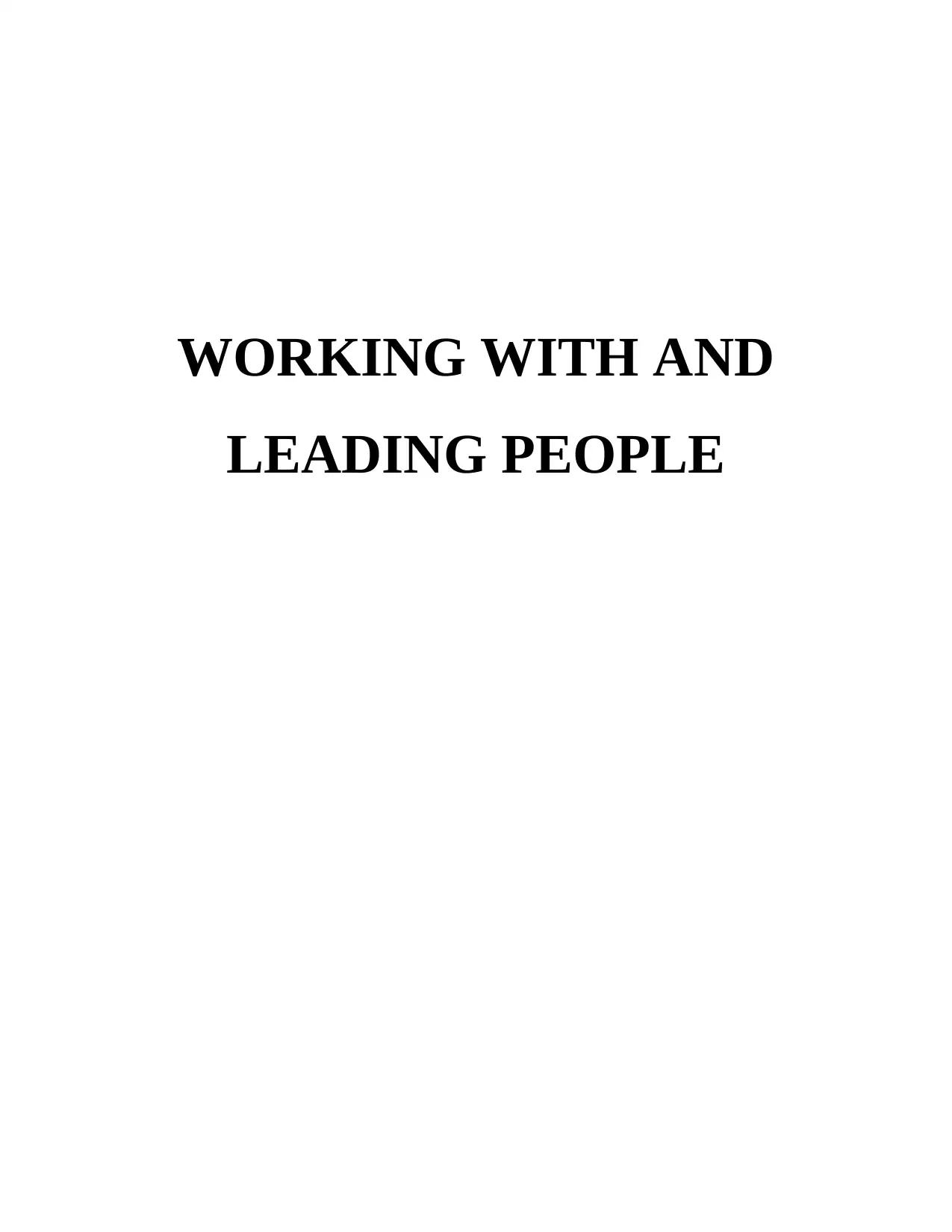
WORKING WITH AND
LEADING PEOPLE
LEADING PEOPLE
Paraphrase This Document
Need a fresh take? Get an instant paraphrase of this document with our AI Paraphraser
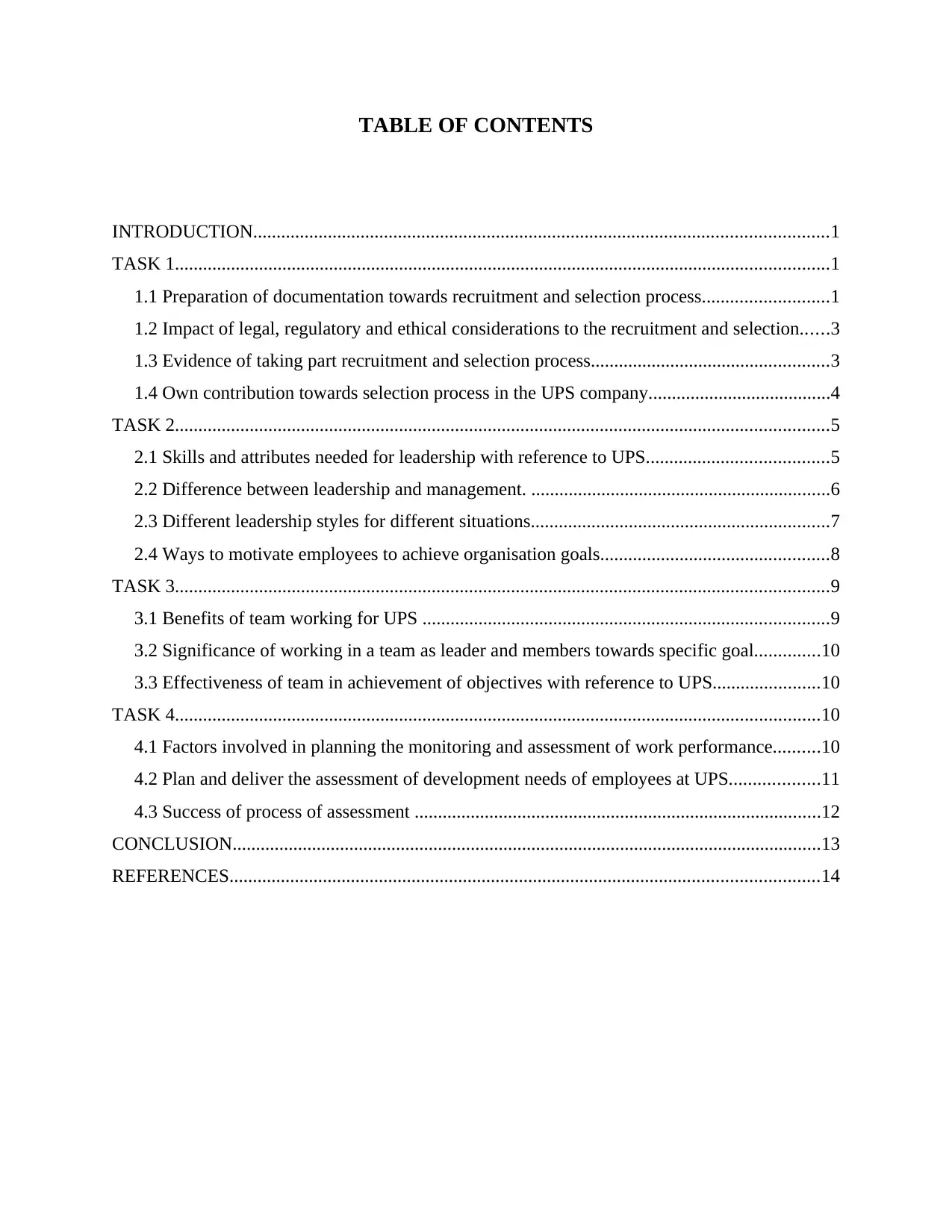
TABLE OF CONTENTS
INTRODUCTION...........................................................................................................................1
TASK 1............................................................................................................................................1
1.1 Preparation of documentation towards recruitment and selection process...........................1
1.2 Impact of legal, regulatory and ethical considerations to the recruitment and selection......3
1.3 Evidence of taking part recruitment and selection process...................................................3
1.4 Own contribution towards selection process in the UPS company.......................................4
TASK 2............................................................................................................................................5
2.1 Skills and attributes needed for leadership with reference to UPS.......................................5
2.2 Difference between leadership and management. ................................................................6
2.3 Different leadership styles for different situations................................................................7
2.4 Ways to motivate employees to achieve organisation goals.................................................8
TASK 3............................................................................................................................................9
3.1 Benefits of team working for UPS .......................................................................................9
3.2 Significance of working in a team as leader and members towards specific goal..............10
3.3 Effectiveness of team in achievement of objectives with reference to UPS.......................10
TASK 4..........................................................................................................................................10
4.1 Factors involved in planning the monitoring and assessment of work performance..........10
4.2 Plan and deliver the assessment of development needs of employees at UPS...................11
4.3 Success of process of assessment .......................................................................................12
CONCLUSION..............................................................................................................................13
REFERENCES..............................................................................................................................14
INTRODUCTION...........................................................................................................................1
TASK 1............................................................................................................................................1
1.1 Preparation of documentation towards recruitment and selection process...........................1
1.2 Impact of legal, regulatory and ethical considerations to the recruitment and selection......3
1.3 Evidence of taking part recruitment and selection process...................................................3
1.4 Own contribution towards selection process in the UPS company.......................................4
TASK 2............................................................................................................................................5
2.1 Skills and attributes needed for leadership with reference to UPS.......................................5
2.2 Difference between leadership and management. ................................................................6
2.3 Different leadership styles for different situations................................................................7
2.4 Ways to motivate employees to achieve organisation goals.................................................8
TASK 3............................................................................................................................................9
3.1 Benefits of team working for UPS .......................................................................................9
3.2 Significance of working in a team as leader and members towards specific goal..............10
3.3 Effectiveness of team in achievement of objectives with reference to UPS.......................10
TASK 4..........................................................................................................................................10
4.1 Factors involved in planning the monitoring and assessment of work performance..........10
4.2 Plan and deliver the assessment of development needs of employees at UPS...................11
4.3 Success of process of assessment .......................................................................................12
CONCLUSION..............................................................................................................................13
REFERENCES..............................................................................................................................14
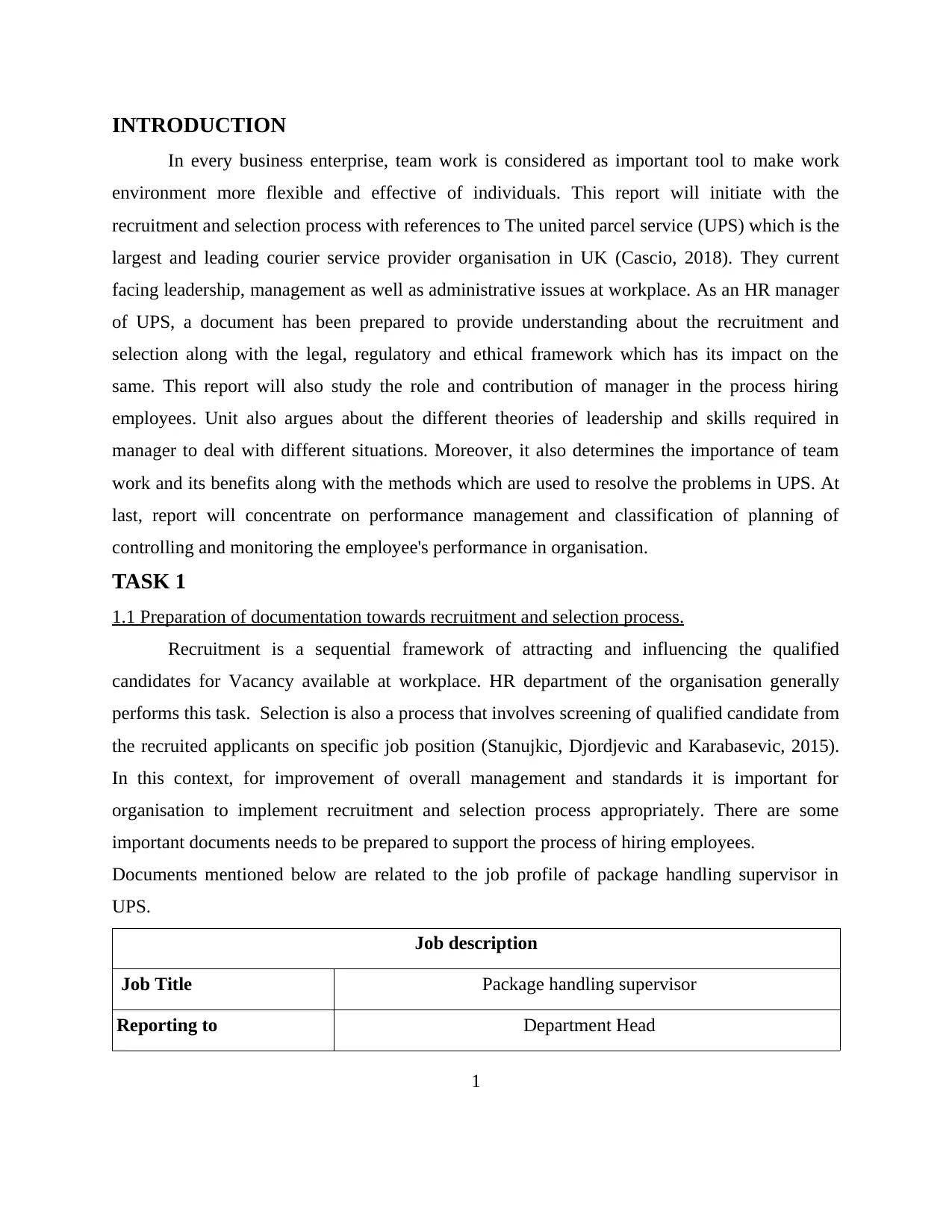
INTRODUCTION
In every business enterprise, team work is considered as important tool to make work
environment more flexible and effective of individuals. This report will initiate with the
recruitment and selection process with references to The united parcel service (UPS) which is the
largest and leading courier service provider organisation in UK (Cascio, 2018). They current
facing leadership, management as well as administrative issues at workplace. As an HR manager
of UPS, a document has been prepared to provide understanding about the recruitment and
selection along with the legal, regulatory and ethical framework which has its impact on the
same. This report will also study the role and contribution of manager in the process hiring
employees. Unit also argues about the different theories of leadership and skills required in
manager to deal with different situations. Moreover, it also determines the importance of team
work and its benefits along with the methods which are used to resolve the problems in UPS. At
last, report will concentrate on performance management and classification of planning of
controlling and monitoring the employee's performance in organisation.
TASK 1
1.1 Preparation of documentation towards recruitment and selection process.
Recruitment is a sequential framework of attracting and influencing the qualified
candidates for Vacancy available at workplace. HR department of the organisation generally
performs this task. Selection is also a process that involves screening of qualified candidate from
the recruited applicants on specific job position (Stanujkic, Djordjevic and Karabasevic, 2015).
In this context, for improvement of overall management and standards it is important for
organisation to implement recruitment and selection process appropriately. There are some
important documents needs to be prepared to support the process of hiring employees.
Documents mentioned below are related to the job profile of package handling supervisor in
UPS.
Job description
Job Title Package handling supervisor
Reporting to Department Head
1
In every business enterprise, team work is considered as important tool to make work
environment more flexible and effective of individuals. This report will initiate with the
recruitment and selection process with references to The united parcel service (UPS) which is the
largest and leading courier service provider organisation in UK (Cascio, 2018). They current
facing leadership, management as well as administrative issues at workplace. As an HR manager
of UPS, a document has been prepared to provide understanding about the recruitment and
selection along with the legal, regulatory and ethical framework which has its impact on the
same. This report will also study the role and contribution of manager in the process hiring
employees. Unit also argues about the different theories of leadership and skills required in
manager to deal with different situations. Moreover, it also determines the importance of team
work and its benefits along with the methods which are used to resolve the problems in UPS. At
last, report will concentrate on performance management and classification of planning of
controlling and monitoring the employee's performance in organisation.
TASK 1
1.1 Preparation of documentation towards recruitment and selection process.
Recruitment is a sequential framework of attracting and influencing the qualified
candidates for Vacancy available at workplace. HR department of the organisation generally
performs this task. Selection is also a process that involves screening of qualified candidate from
the recruited applicants on specific job position (Stanujkic, Djordjevic and Karabasevic, 2015).
In this context, for improvement of overall management and standards it is important for
organisation to implement recruitment and selection process appropriately. There are some
important documents needs to be prepared to support the process of hiring employees.
Documents mentioned below are related to the job profile of package handling supervisor in
UPS.
Job description
Job Title Package handling supervisor
Reporting to Department Head
1
⊘ This is a preview!⊘
Do you want full access?
Subscribe today to unlock all pages.

Trusted by 1+ million students worldwide
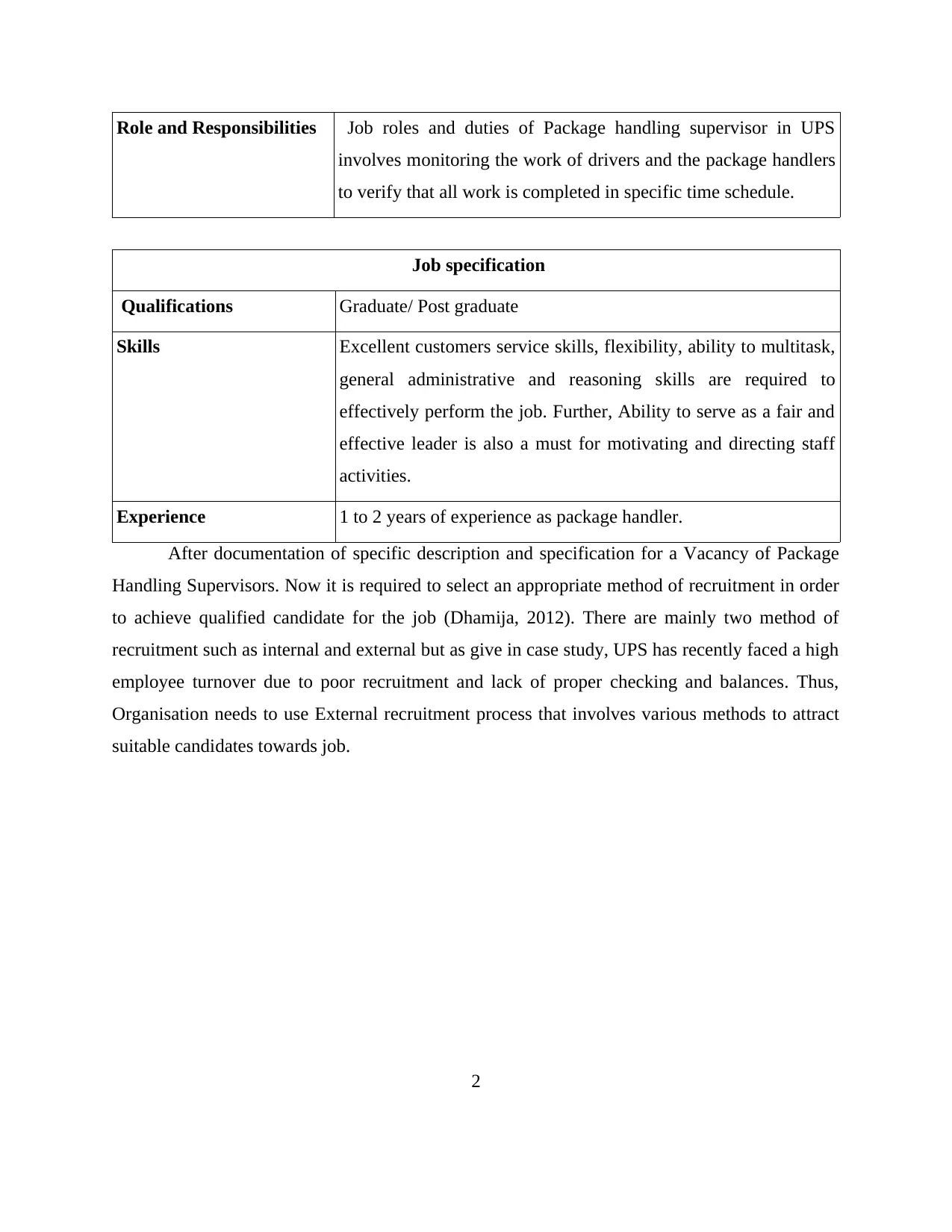
Role and Responsibilities Job roles and duties of Package handling supervisor in UPS
involves monitoring the work of drivers and the package handlers
to verify that all work is completed in specific time schedule.
Job specification
Qualifications Graduate/ Post graduate
Skills Excellent customers service skills, flexibility, ability to multitask,
general administrative and reasoning skills are required to
effectively perform the job. Further, Ability to serve as a fair and
effective leader is also a must for motivating and directing staff
activities.
Experience 1 to 2 years of experience as package handler.
After documentation of specific description and specification for a Vacancy of Package
Handling Supervisors. Now it is required to select an appropriate method of recruitment in order
to achieve qualified candidate for the job (Dhamija, 2012). There are mainly two method of
recruitment such as internal and external but as give in case study, UPS has recently faced a high
employee turnover due to poor recruitment and lack of proper checking and balances. Thus,
Organisation needs to use External recruitment process that involves various methods to attract
suitable candidates towards job.
2
involves monitoring the work of drivers and the package handlers
to verify that all work is completed in specific time schedule.
Job specification
Qualifications Graduate/ Post graduate
Skills Excellent customers service skills, flexibility, ability to multitask,
general administrative and reasoning skills are required to
effectively perform the job. Further, Ability to serve as a fair and
effective leader is also a must for motivating and directing staff
activities.
Experience 1 to 2 years of experience as package handler.
After documentation of specific description and specification for a Vacancy of Package
Handling Supervisors. Now it is required to select an appropriate method of recruitment in order
to achieve qualified candidate for the job (Dhamija, 2012). There are mainly two method of
recruitment such as internal and external but as give in case study, UPS has recently faced a high
employee turnover due to poor recruitment and lack of proper checking and balances. Thus,
Organisation needs to use External recruitment process that involves various methods to attract
suitable candidates towards job.
2
Paraphrase This Document
Need a fresh take? Get an instant paraphrase of this document with our AI Paraphraser
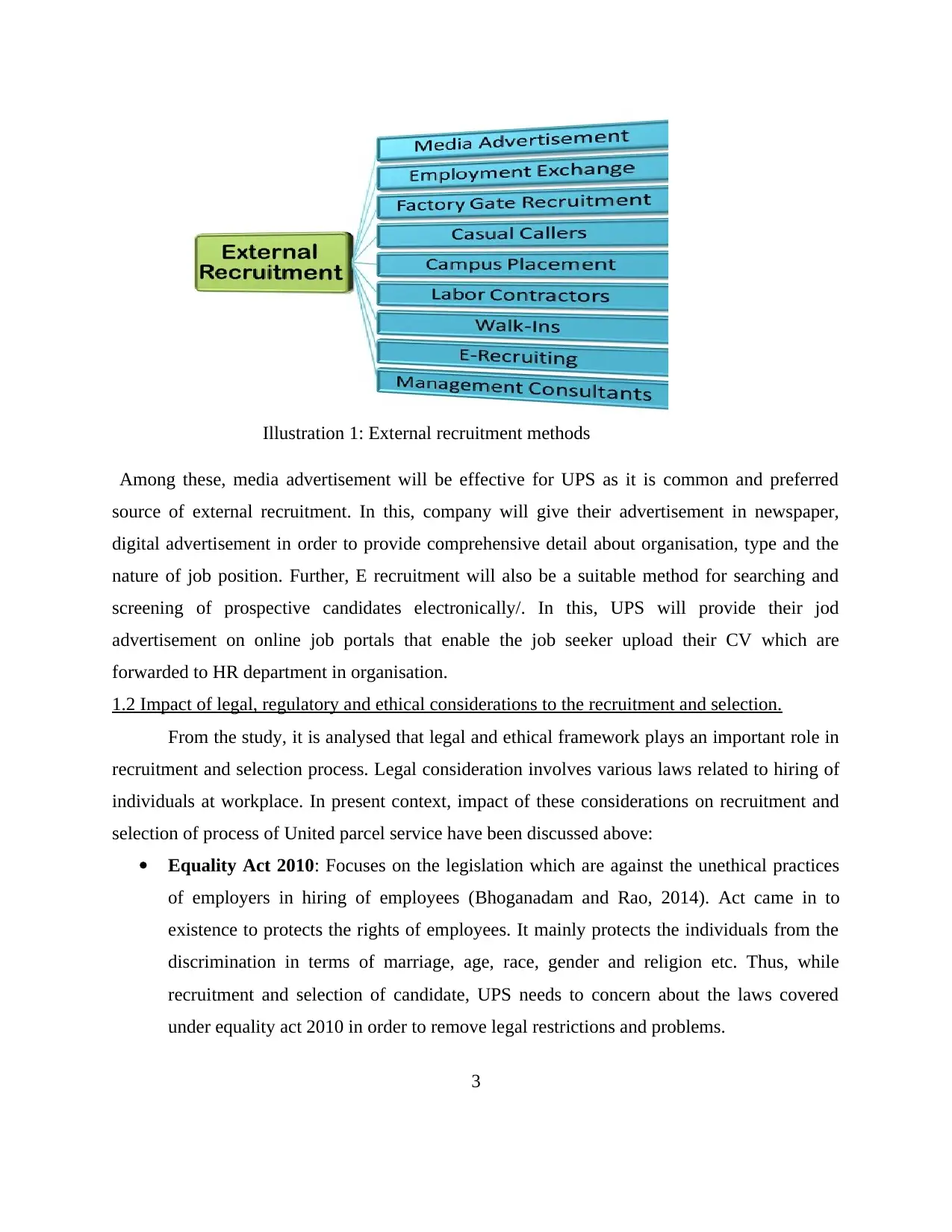
Among these, media advertisement will be effective for UPS as it is common and preferred
source of external recruitment. In this, company will give their advertisement in newspaper,
digital advertisement in order to provide comprehensive detail about organisation, type and the
nature of job position. Further, E recruitment will also be a suitable method for searching and
screening of prospective candidates electronically/. In this, UPS will provide their jod
advertisement on online job portals that enable the job seeker upload their CV which are
forwarded to HR department in organisation.
1.2 Impact of legal, regulatory and ethical considerations to the recruitment and selection.
From the study, it is analysed that legal and ethical framework plays an important role in
recruitment and selection process. Legal consideration involves various laws related to hiring of
individuals at workplace. In present context, impact of these considerations on recruitment and
selection of process of United parcel service have been discussed above:
Equality Act 2010: Focuses on the legislation which are against the unethical practices
of employers in hiring of employees (Bhoganadam and Rao, 2014). Act came in to
existence to protects the rights of employees. It mainly protects the individuals from the
discrimination in terms of marriage, age, race, gender and religion etc. Thus, while
recruitment and selection of candidate, UPS needs to concern about the laws covered
under equality act 2010 in order to remove legal restrictions and problems.
3
Illustration 1: External recruitment methods
(Source: External Sources of Recruitment, 2017)
source of external recruitment. In this, company will give their advertisement in newspaper,
digital advertisement in order to provide comprehensive detail about organisation, type and the
nature of job position. Further, E recruitment will also be a suitable method for searching and
screening of prospective candidates electronically/. In this, UPS will provide their jod
advertisement on online job portals that enable the job seeker upload their CV which are
forwarded to HR department in organisation.
1.2 Impact of legal, regulatory and ethical considerations to the recruitment and selection.
From the study, it is analysed that legal and ethical framework plays an important role in
recruitment and selection process. Legal consideration involves various laws related to hiring of
individuals at workplace. In present context, impact of these considerations on recruitment and
selection of process of United parcel service have been discussed above:
Equality Act 2010: Focuses on the legislation which are against the unethical practices
of employers in hiring of employees (Bhoganadam and Rao, 2014). Act came in to
existence to protects the rights of employees. It mainly protects the individuals from the
discrimination in terms of marriage, age, race, gender and religion etc. Thus, while
recruitment and selection of candidate, UPS needs to concern about the laws covered
under equality act 2010 in order to remove legal restrictions and problems.
3
Illustration 1: External recruitment methods
(Source: External Sources of Recruitment, 2017)
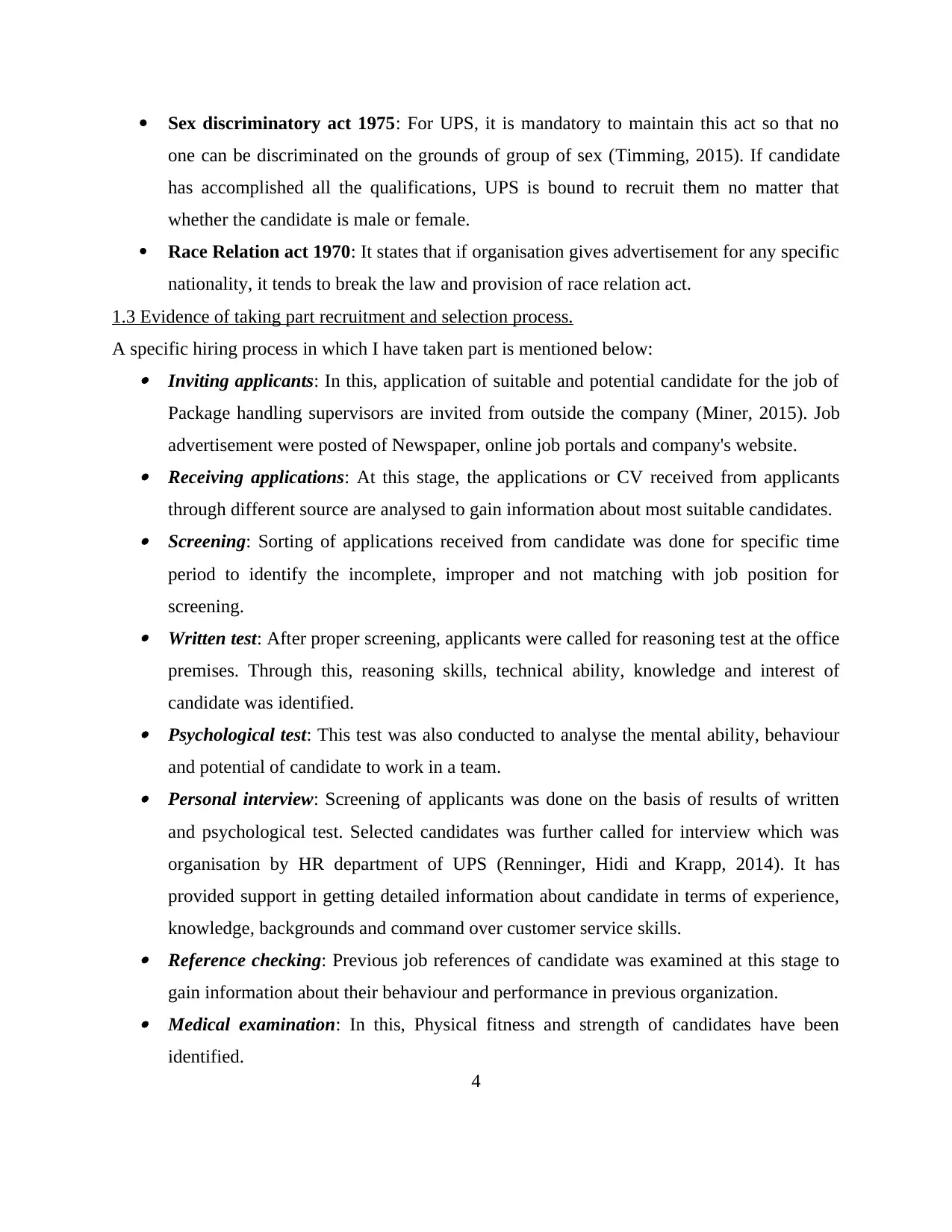
Sex discriminatory act 1975: For UPS, it is mandatory to maintain this act so that no
one can be discriminated on the grounds of group of sex (Timming, 2015). If candidate
has accomplished all the qualifications, UPS is bound to recruit them no matter that
whether the candidate is male or female.
Race Relation act 1970: It states that if organisation gives advertisement for any specific
nationality, it tends to break the law and provision of race relation act.
1.3 Evidence of taking part recruitment and selection process.
A specific hiring process in which I have taken part is mentioned below: Inviting applicants: In this, application of suitable and potential candidate for the job of
Package handling supervisors are invited from outside the company (Miner, 2015). Job
advertisement were posted of Newspaper, online job portals and company's website. Receiving applications: At this stage, the applications or CV received from applicants
through different source are analysed to gain information about most suitable candidates. Screening: Sorting of applications received from candidate was done for specific time
period to identify the incomplete, improper and not matching with job position for
screening. Written test: After proper screening, applicants were called for reasoning test at the office
premises. Through this, reasoning skills, technical ability, knowledge and interest of
candidate was identified. Psychological test: This test was also conducted to analyse the mental ability, behaviour
and potential of candidate to work in a team. Personal interview: Screening of applicants was done on the basis of results of written
and psychological test. Selected candidates was further called for interview which was
organisation by HR department of UPS (Renninger, Hidi and Krapp, 2014). It has
provided support in getting detailed information about candidate in terms of experience,
knowledge, backgrounds and command over customer service skills. Reference checking: Previous job references of candidate was examined at this stage to
gain information about their behaviour and performance in previous organization. Medical examination: In this, Physical fitness and strength of candidates have been
identified.
4
one can be discriminated on the grounds of group of sex (Timming, 2015). If candidate
has accomplished all the qualifications, UPS is bound to recruit them no matter that
whether the candidate is male or female.
Race Relation act 1970: It states that if organisation gives advertisement for any specific
nationality, it tends to break the law and provision of race relation act.
1.3 Evidence of taking part recruitment and selection process.
A specific hiring process in which I have taken part is mentioned below: Inviting applicants: In this, application of suitable and potential candidate for the job of
Package handling supervisors are invited from outside the company (Miner, 2015). Job
advertisement were posted of Newspaper, online job portals and company's website. Receiving applications: At this stage, the applications or CV received from applicants
through different source are analysed to gain information about most suitable candidates. Screening: Sorting of applications received from candidate was done for specific time
period to identify the incomplete, improper and not matching with job position for
screening. Written test: After proper screening, applicants were called for reasoning test at the office
premises. Through this, reasoning skills, technical ability, knowledge and interest of
candidate was identified. Psychological test: This test was also conducted to analyse the mental ability, behaviour
and potential of candidate to work in a team. Personal interview: Screening of applicants was done on the basis of results of written
and psychological test. Selected candidates was further called for interview which was
organisation by HR department of UPS (Renninger, Hidi and Krapp, 2014). It has
provided support in getting detailed information about candidate in terms of experience,
knowledge, backgrounds and command over customer service skills. Reference checking: Previous job references of candidate was examined at this stage to
gain information about their behaviour and performance in previous organization. Medical examination: In this, Physical fitness and strength of candidates have been
identified.
4
⊘ This is a preview!⊘
Do you want full access?
Subscribe today to unlock all pages.

Trusted by 1+ million students worldwide
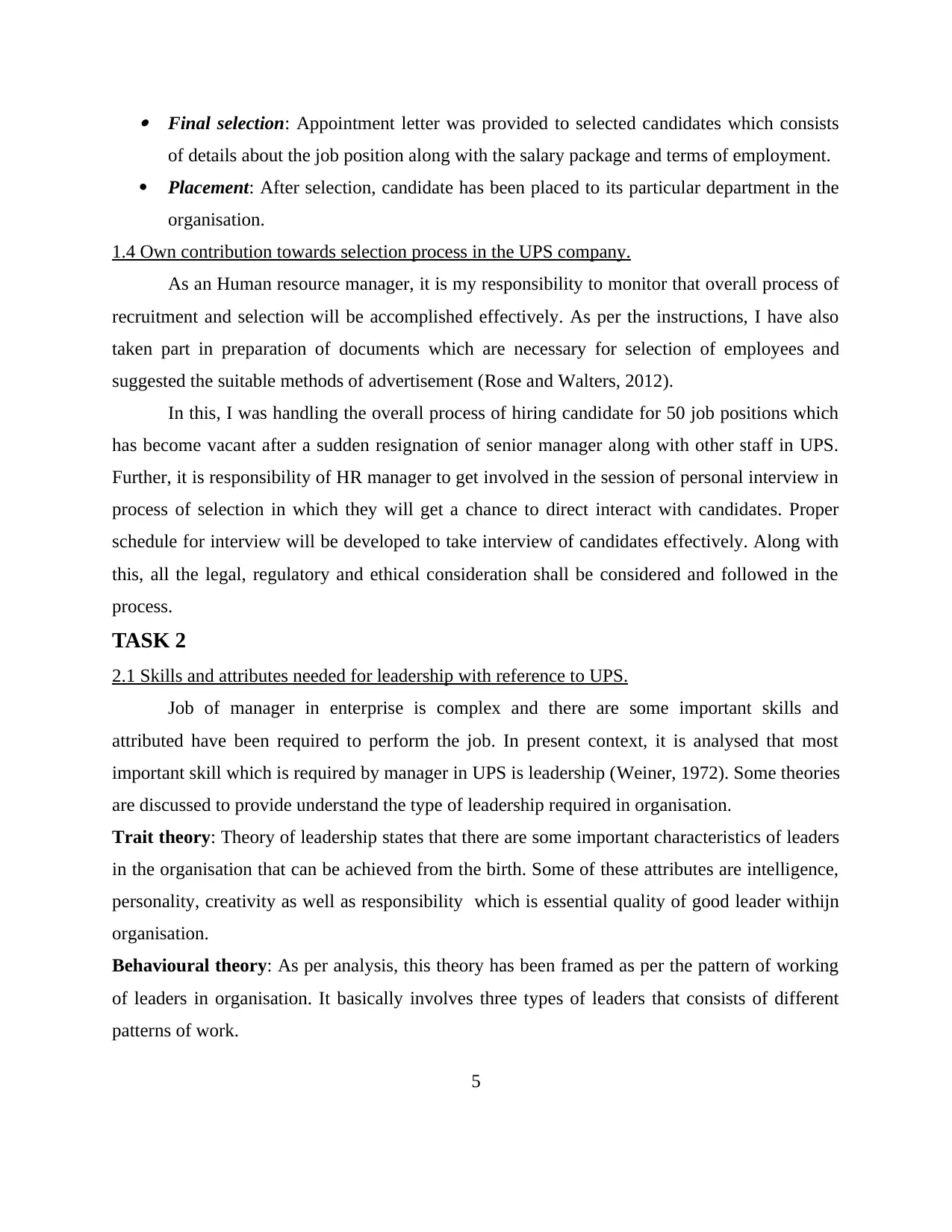
Final selection: Appointment letter was provided to selected candidates which consists
of details about the job position along with the salary package and terms of employment.
Placement: After selection, candidate has been placed to its particular department in the
organisation.
1.4 Own contribution towards selection process in the UPS company.
As an Human resource manager, it is my responsibility to monitor that overall process of
recruitment and selection will be accomplished effectively. As per the instructions, I have also
taken part in preparation of documents which are necessary for selection of employees and
suggested the suitable methods of advertisement (Rose and Walters, 2012).
In this, I was handling the overall process of hiring candidate for 50 job positions which
has become vacant after a sudden resignation of senior manager along with other staff in UPS.
Further, it is responsibility of HR manager to get involved in the session of personal interview in
process of selection in which they will get a chance to direct interact with candidates. Proper
schedule for interview will be developed to take interview of candidates effectively. Along with
this, all the legal, regulatory and ethical consideration shall be considered and followed in the
process.
TASK 2
2.1 Skills and attributes needed for leadership with reference to UPS.
Job of manager in enterprise is complex and there are some important skills and
attributed have been required to perform the job. In present context, it is analysed that most
important skill which is required by manager in UPS is leadership (Weiner, 1972). Some theories
are discussed to provide understand the type of leadership required in organisation.
Trait theory: Theory of leadership states that there are some important characteristics of leaders
in the organisation that can be achieved from the birth. Some of these attributes are intelligence,
personality, creativity as well as responsibility which is essential quality of good leader withijn
organisation.
Behavioural theory: As per analysis, this theory has been framed as per the pattern of working
of leaders in organisation. It basically involves three types of leaders that consists of different
patterns of work.
5
of details about the job position along with the salary package and terms of employment.
Placement: After selection, candidate has been placed to its particular department in the
organisation.
1.4 Own contribution towards selection process in the UPS company.
As an Human resource manager, it is my responsibility to monitor that overall process of
recruitment and selection will be accomplished effectively. As per the instructions, I have also
taken part in preparation of documents which are necessary for selection of employees and
suggested the suitable methods of advertisement (Rose and Walters, 2012).
In this, I was handling the overall process of hiring candidate for 50 job positions which
has become vacant after a sudden resignation of senior manager along with other staff in UPS.
Further, it is responsibility of HR manager to get involved in the session of personal interview in
process of selection in which they will get a chance to direct interact with candidates. Proper
schedule for interview will be developed to take interview of candidates effectively. Along with
this, all the legal, regulatory and ethical consideration shall be considered and followed in the
process.
TASK 2
2.1 Skills and attributes needed for leadership with reference to UPS.
Job of manager in enterprise is complex and there are some important skills and
attributed have been required to perform the job. In present context, it is analysed that most
important skill which is required by manager in UPS is leadership (Weiner, 1972). Some theories
are discussed to provide understand the type of leadership required in organisation.
Trait theory: Theory of leadership states that there are some important characteristics of leaders
in the organisation that can be achieved from the birth. Some of these attributes are intelligence,
personality, creativity as well as responsibility which is essential quality of good leader withijn
organisation.
Behavioural theory: As per analysis, this theory has been framed as per the pattern of working
of leaders in organisation. It basically involves three types of leaders that consists of different
patterns of work.
5
Paraphrase This Document
Need a fresh take? Get an instant paraphrase of this document with our AI Paraphraser
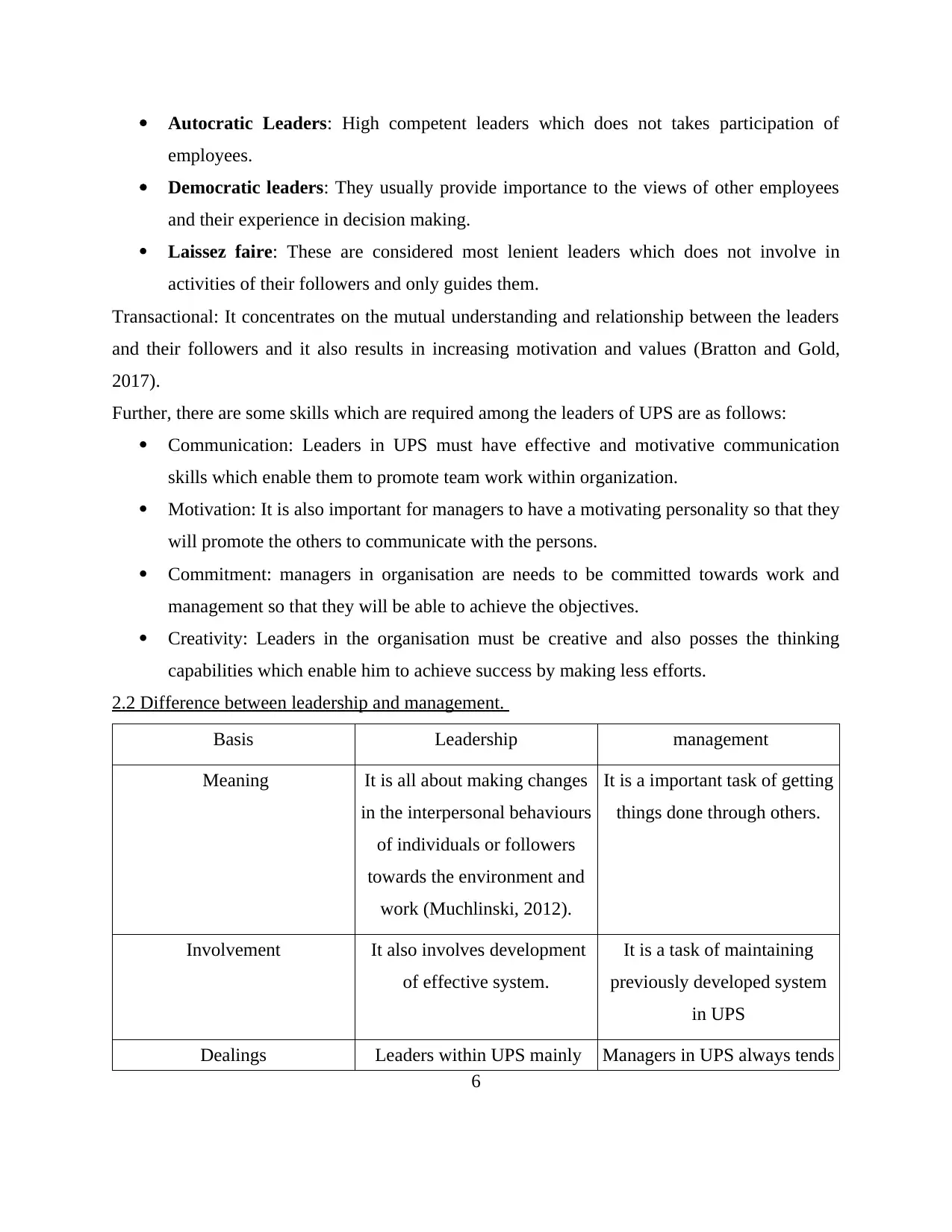
Autocratic Leaders: High competent leaders which does not takes participation of
employees.
Democratic leaders: They usually provide importance to the views of other employees
and their experience in decision making.
Laissez faire: These are considered most lenient leaders which does not involve in
activities of their followers and only guides them.
Transactional: It concentrates on the mutual understanding and relationship between the leaders
and their followers and it also results in increasing motivation and values (Bratton and Gold,
2017).
Further, there are some skills which are required among the leaders of UPS are as follows:
Communication: Leaders in UPS must have effective and motivative communication
skills which enable them to promote team work within organization.
Motivation: It is also important for managers to have a motivating personality so that they
will promote the others to communicate with the persons.
Commitment: managers in organisation are needs to be committed towards work and
management so that they will be able to achieve the objectives.
Creativity: Leaders in the organisation must be creative and also posses the thinking
capabilities which enable him to achieve success by making less efforts.
2.2 Difference between leadership and management.
Basis Leadership management
Meaning It is all about making changes
in the interpersonal behaviours
of individuals or followers
towards the environment and
work (Muchlinski, 2012).
It is a important task of getting
things done through others.
Involvement It also involves development
of effective system.
It is a task of maintaining
previously developed system
in UPS
Dealings Leaders within UPS mainly Managers in UPS always tends
6
employees.
Democratic leaders: They usually provide importance to the views of other employees
and their experience in decision making.
Laissez faire: These are considered most lenient leaders which does not involve in
activities of their followers and only guides them.
Transactional: It concentrates on the mutual understanding and relationship between the leaders
and their followers and it also results in increasing motivation and values (Bratton and Gold,
2017).
Further, there are some skills which are required among the leaders of UPS are as follows:
Communication: Leaders in UPS must have effective and motivative communication
skills which enable them to promote team work within organization.
Motivation: It is also important for managers to have a motivating personality so that they
will promote the others to communicate with the persons.
Commitment: managers in organisation are needs to be committed towards work and
management so that they will be able to achieve the objectives.
Creativity: Leaders in the organisation must be creative and also posses the thinking
capabilities which enable him to achieve success by making less efforts.
2.2 Difference between leadership and management.
Basis Leadership management
Meaning It is all about making changes
in the interpersonal behaviours
of individuals or followers
towards the environment and
work (Muchlinski, 2012).
It is a important task of getting
things done through others.
Involvement It also involves development
of effective system.
It is a task of maintaining
previously developed system
in UPS
Dealings Leaders within UPS mainly Managers in UPS always tends
6
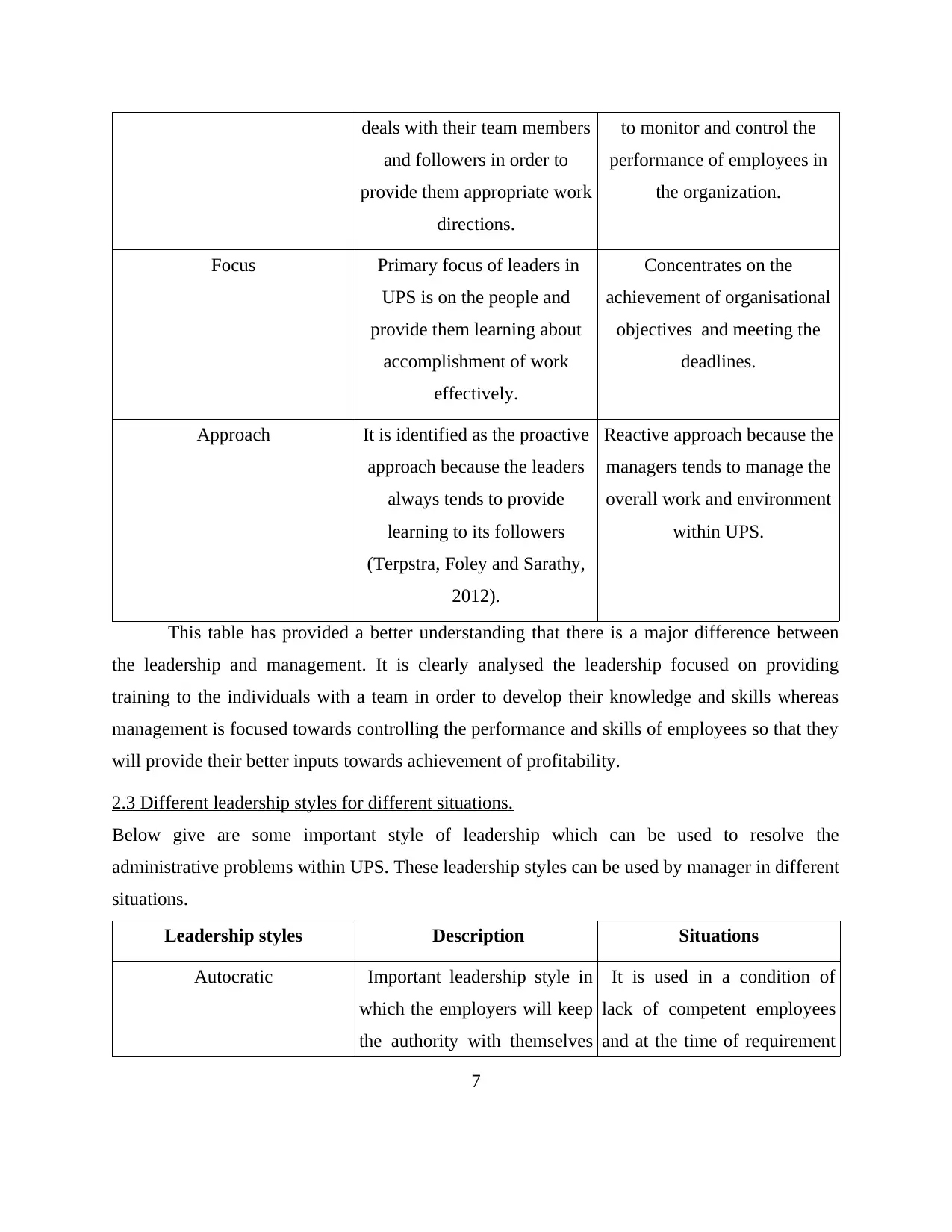
deals with their team members
and followers in order to
provide them appropriate work
directions.
to monitor and control the
performance of employees in
the organization.
Focus Primary focus of leaders in
UPS is on the people and
provide them learning about
accomplishment of work
effectively.
Concentrates on the
achievement of organisational
objectives and meeting the
deadlines.
Approach It is identified as the proactive
approach because the leaders
always tends to provide
learning to its followers
(Terpstra, Foley and Sarathy,
2012).
Reactive approach because the
managers tends to manage the
overall work and environment
within UPS.
This table has provided a better understanding that there is a major difference between
the leadership and management. It is clearly analysed the leadership focused on providing
training to the individuals with a team in order to develop their knowledge and skills whereas
management is focused towards controlling the performance and skills of employees so that they
will provide their better inputs towards achievement of profitability.
2.3 Different leadership styles for different situations.
Below give are some important style of leadership which can be used to resolve the
administrative problems within UPS. These leadership styles can be used by manager in different
situations.
Leadership styles Description Situations
Autocratic Important leadership style in
which the employers will keep
the authority with themselves
It is used in a condition of
lack of competent employees
and at the time of requirement
7
and followers in order to
provide them appropriate work
directions.
to monitor and control the
performance of employees in
the organization.
Focus Primary focus of leaders in
UPS is on the people and
provide them learning about
accomplishment of work
effectively.
Concentrates on the
achievement of organisational
objectives and meeting the
deadlines.
Approach It is identified as the proactive
approach because the leaders
always tends to provide
learning to its followers
(Terpstra, Foley and Sarathy,
2012).
Reactive approach because the
managers tends to manage the
overall work and environment
within UPS.
This table has provided a better understanding that there is a major difference between
the leadership and management. It is clearly analysed the leadership focused on providing
training to the individuals with a team in order to develop their knowledge and skills whereas
management is focused towards controlling the performance and skills of employees so that they
will provide their better inputs towards achievement of profitability.
2.3 Different leadership styles for different situations.
Below give are some important style of leadership which can be used to resolve the
administrative problems within UPS. These leadership styles can be used by manager in different
situations.
Leadership styles Description Situations
Autocratic Important leadership style in
which the employers will keep
the authority with themselves
It is used in a condition of
lack of competent employees
and at the time of requirement
7
⊘ This is a preview!⊘
Do you want full access?
Subscribe today to unlock all pages.

Trusted by 1+ million students worldwide
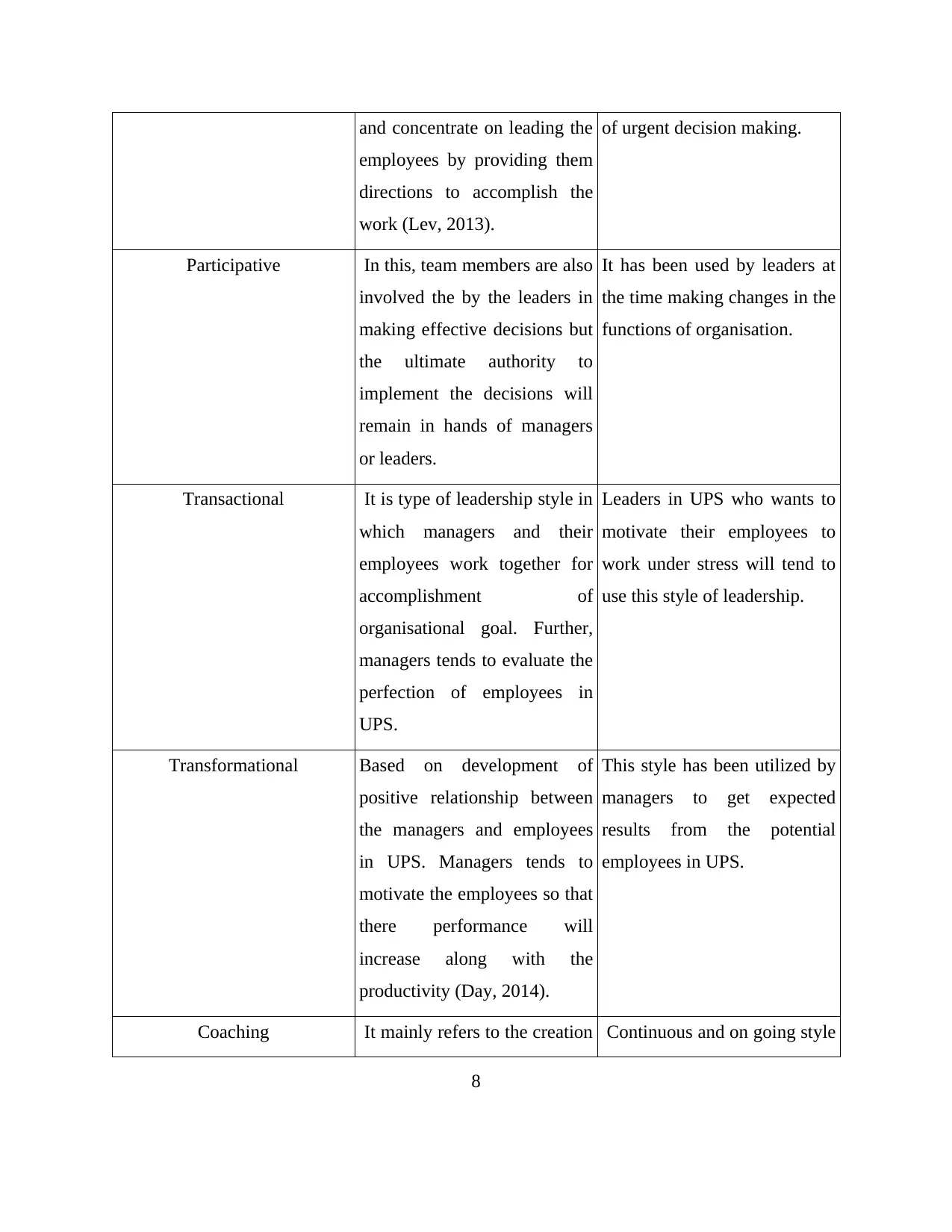
and concentrate on leading the
employees by providing them
directions to accomplish the
work (Lev, 2013).
of urgent decision making.
Participative In this, team members are also
involved the by the leaders in
making effective decisions but
the ultimate authority to
implement the decisions will
remain in hands of managers
or leaders.
It has been used by leaders at
the time making changes in the
functions of organisation.
Transactional It is type of leadership style in
which managers and their
employees work together for
accomplishment of
organisational goal. Further,
managers tends to evaluate the
perfection of employees in
UPS.
Leaders in UPS who wants to
motivate their employees to
work under stress will tend to
use this style of leadership.
Transformational Based on development of
positive relationship between
the managers and employees
in UPS. Managers tends to
motivate the employees so that
there performance will
increase along with the
productivity (Day, 2014).
This style has been utilized by
managers to get expected
results from the potential
employees in UPS.
Coaching It mainly refers to the creation Continuous and on going style
8
employees by providing them
directions to accomplish the
work (Lev, 2013).
of urgent decision making.
Participative In this, team members are also
involved the by the leaders in
making effective decisions but
the ultimate authority to
implement the decisions will
remain in hands of managers
or leaders.
It has been used by leaders at
the time making changes in the
functions of organisation.
Transactional It is type of leadership style in
which managers and their
employees work together for
accomplishment of
organisational goal. Further,
managers tends to evaluate the
perfection of employees in
UPS.
Leaders in UPS who wants to
motivate their employees to
work under stress will tend to
use this style of leadership.
Transformational Based on development of
positive relationship between
the managers and employees
in UPS. Managers tends to
motivate the employees so that
there performance will
increase along with the
productivity (Day, 2014).
This style has been utilized by
managers to get expected
results from the potential
employees in UPS.
Coaching It mainly refers to the creation Continuous and on going style
8
Paraphrase This Document
Need a fresh take? Get an instant paraphrase of this document with our AI Paraphraser
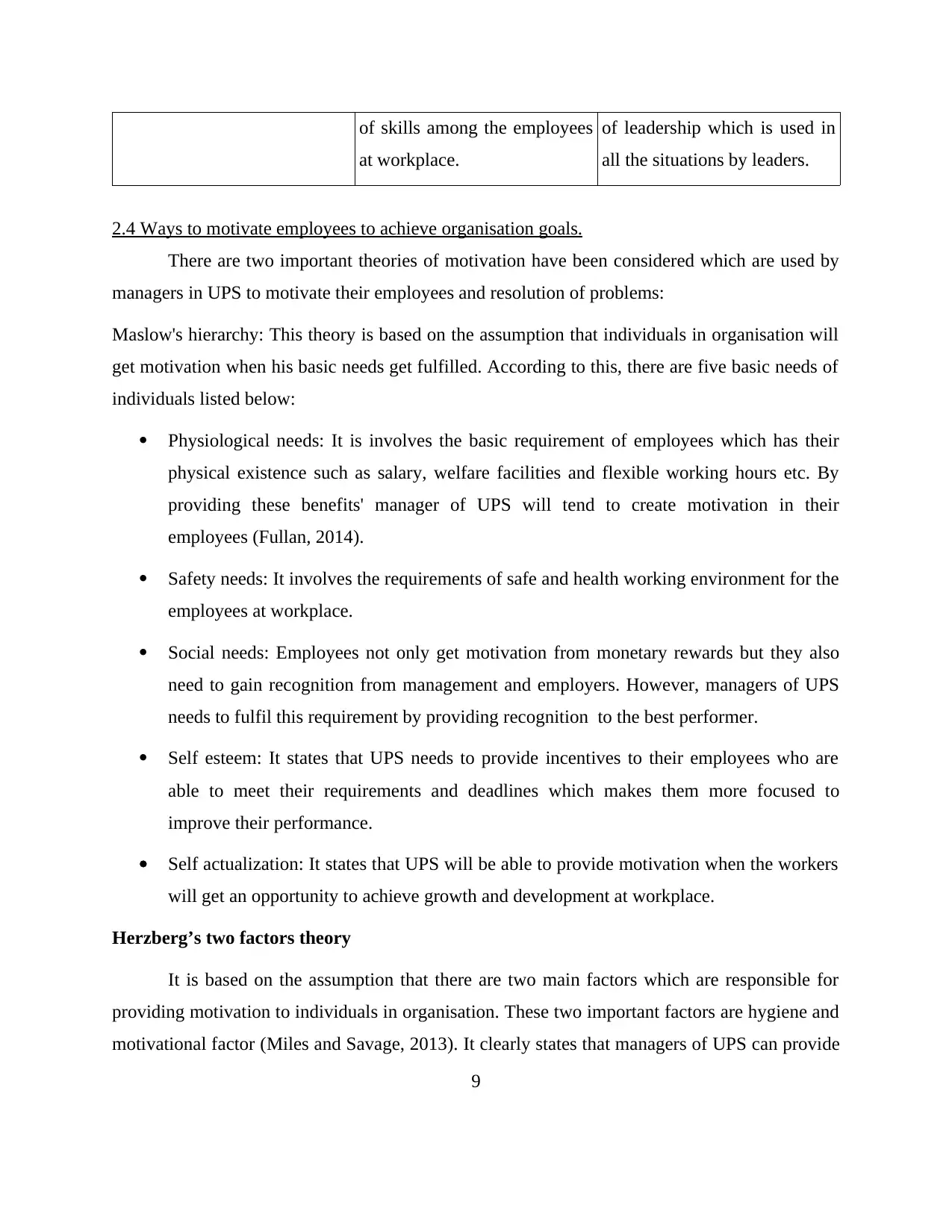
of skills among the employees
at workplace.
of leadership which is used in
all the situations by leaders.
2.4 Ways to motivate employees to achieve organisation goals.
There are two important theories of motivation have been considered which are used by
managers in UPS to motivate their employees and resolution of problems:
Maslow's hierarchy: This theory is based on the assumption that individuals in organisation will
get motivation when his basic needs get fulfilled. According to this, there are five basic needs of
individuals listed below:
Physiological needs: It is involves the basic requirement of employees which has their
physical existence such as salary, welfare facilities and flexible working hours etc. By
providing these benefits' manager of UPS will tend to create motivation in their
employees (Fullan, 2014).
Safety needs: It involves the requirements of safe and health working environment for the
employees at workplace.
Social needs: Employees not only get motivation from monetary rewards but they also
need to gain recognition from management and employers. However, managers of UPS
needs to fulfil this requirement by providing recognition to the best performer.
Self esteem: It states that UPS needs to provide incentives to their employees who are
able to meet their requirements and deadlines which makes them more focused to
improve their performance.
Self actualization: It states that UPS will be able to provide motivation when the workers
will get an opportunity to achieve growth and development at workplace.
Herzberg’s two factors theory
It is based on the assumption that there are two main factors which are responsible for
providing motivation to individuals in organisation. These two important factors are hygiene and
motivational factor (Miles and Savage, 2013). It clearly states that managers of UPS can provide
9
at workplace.
of leadership which is used in
all the situations by leaders.
2.4 Ways to motivate employees to achieve organisation goals.
There are two important theories of motivation have been considered which are used by
managers in UPS to motivate their employees and resolution of problems:
Maslow's hierarchy: This theory is based on the assumption that individuals in organisation will
get motivation when his basic needs get fulfilled. According to this, there are five basic needs of
individuals listed below:
Physiological needs: It is involves the basic requirement of employees which has their
physical existence such as salary, welfare facilities and flexible working hours etc. By
providing these benefits' manager of UPS will tend to create motivation in their
employees (Fullan, 2014).
Safety needs: It involves the requirements of safe and health working environment for the
employees at workplace.
Social needs: Employees not only get motivation from monetary rewards but they also
need to gain recognition from management and employers. However, managers of UPS
needs to fulfil this requirement by providing recognition to the best performer.
Self esteem: It states that UPS needs to provide incentives to their employees who are
able to meet their requirements and deadlines which makes them more focused to
improve their performance.
Self actualization: It states that UPS will be able to provide motivation when the workers
will get an opportunity to achieve growth and development at workplace.
Herzberg’s two factors theory
It is based on the assumption that there are two main factors which are responsible for
providing motivation to individuals in organisation. These two important factors are hygiene and
motivational factor (Miles and Savage, 2013). It clearly states that managers of UPS can provide
9
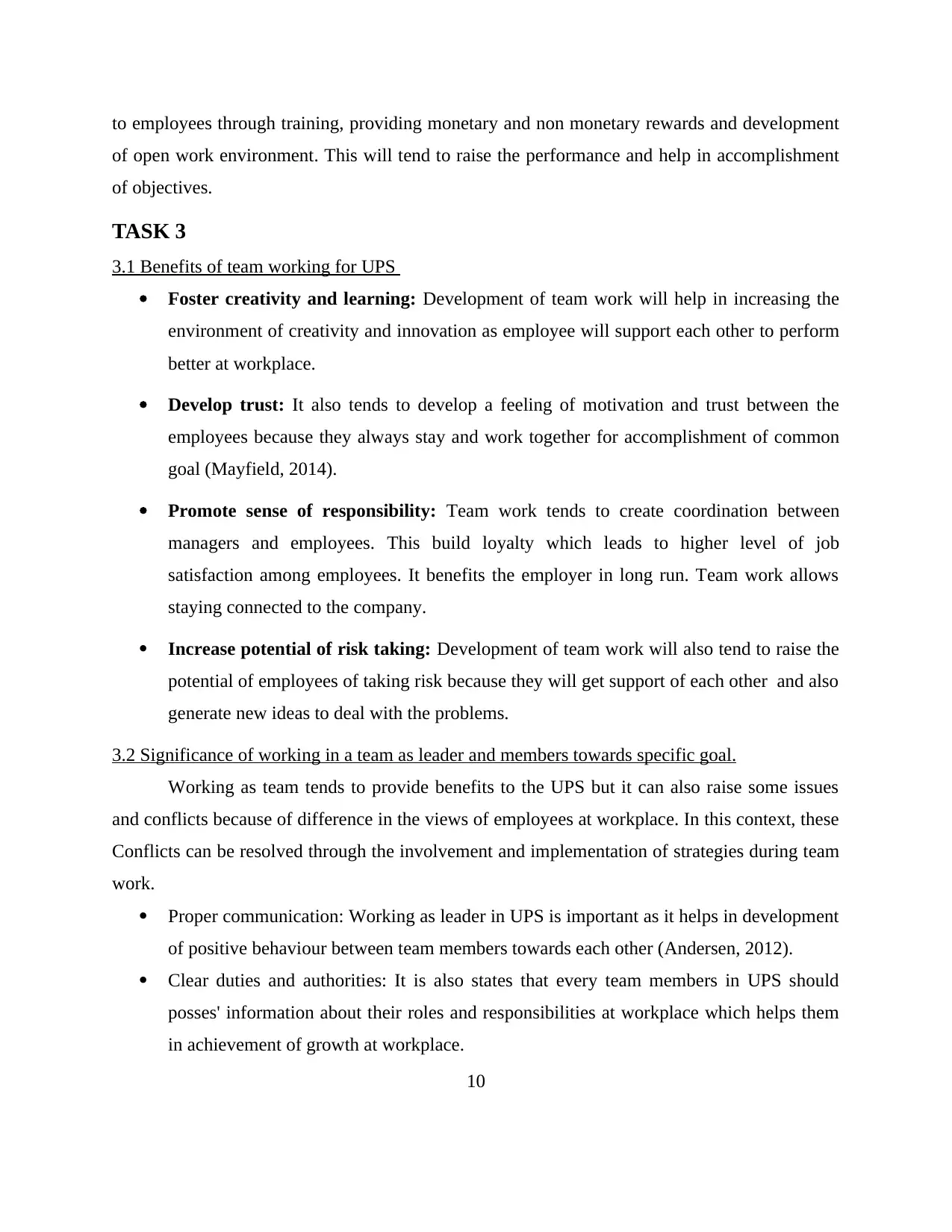
to employees through training, providing monetary and non monetary rewards and development
of open work environment. This will tend to raise the performance and help in accomplishment
of objectives.
TASK 3
3.1 Benefits of team working for UPS
Foster creativity and learning: Development of team work will help in increasing the
environment of creativity and innovation as employee will support each other to perform
better at workplace.
Develop trust: It also tends to develop a feeling of motivation and trust between the
employees because they always stay and work together for accomplishment of common
goal (Mayfield, 2014).
Promote sense of responsibility: Team work tends to create coordination between
managers and employees. This build loyalty which leads to higher level of job
satisfaction among employees. It benefits the employer in long run. Team work allows
staying connected to the company.
Increase potential of risk taking: Development of team work will also tend to raise the
potential of employees of taking risk because they will get support of each other and also
generate new ideas to deal with the problems.
3.2 Significance of working in a team as leader and members towards specific goal.
Working as team tends to provide benefits to the UPS but it can also raise some issues
and conflicts because of difference in the views of employees at workplace. In this context, these
Conflicts can be resolved through the involvement and implementation of strategies during team
work.
Proper communication: Working as leader in UPS is important as it helps in development
of positive behaviour between team members towards each other (Andersen, 2012).
Clear duties and authorities: It is also states that every team members in UPS should
posses' information about their roles and responsibilities at workplace which helps them
in achievement of growth at workplace.
10
of open work environment. This will tend to raise the performance and help in accomplishment
of objectives.
TASK 3
3.1 Benefits of team working for UPS
Foster creativity and learning: Development of team work will help in increasing the
environment of creativity and innovation as employee will support each other to perform
better at workplace.
Develop trust: It also tends to develop a feeling of motivation and trust between the
employees because they always stay and work together for accomplishment of common
goal (Mayfield, 2014).
Promote sense of responsibility: Team work tends to create coordination between
managers and employees. This build loyalty which leads to higher level of job
satisfaction among employees. It benefits the employer in long run. Team work allows
staying connected to the company.
Increase potential of risk taking: Development of team work will also tend to raise the
potential of employees of taking risk because they will get support of each other and also
generate new ideas to deal with the problems.
3.2 Significance of working in a team as leader and members towards specific goal.
Working as team tends to provide benefits to the UPS but it can also raise some issues
and conflicts because of difference in the views of employees at workplace. In this context, these
Conflicts can be resolved through the involvement and implementation of strategies during team
work.
Proper communication: Working as leader in UPS is important as it helps in development
of positive behaviour between team members towards each other (Andersen, 2012).
Clear duties and authorities: It is also states that every team members in UPS should
posses' information about their roles and responsibilities at workplace which helps them
in achievement of growth at workplace.
10
⊘ This is a preview!⊘
Do you want full access?
Subscribe today to unlock all pages.

Trusted by 1+ million students worldwide
1 out of 17
Related Documents
Your All-in-One AI-Powered Toolkit for Academic Success.
+13062052269
info@desklib.com
Available 24*7 on WhatsApp / Email
![[object Object]](/_next/static/media/star-bottom.7253800d.svg)
Unlock your academic potential
Copyright © 2020–2025 A2Z Services. All Rights Reserved. Developed and managed by ZUCOL.





